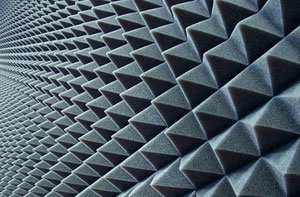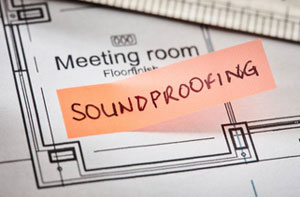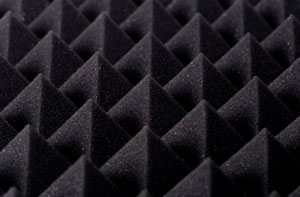Soundproofing Services: If the constant noise in your UK residence is causing you distress, whether it's in your home office, bedroom, living room, or studio, you should consider exploring options for installing or enhancing soundproofing. There might be instances where soundproofing becomes necessary to prevent disturbances in scenarios like a home cinema, music room, or children's room. Regardless of the specific soundproofing needs, prioritising both your peace of mind and your neighbour's well-being is essential for maintaining sanity and tranquility.
Prior to devising approaches to combat sound pollution, it would be beneficial to gain a comprehensive understanding of the mechanics behind the propagation and transmission of sound.

Basically, sound moves in two ways throughout your room:
1. By vibration of solid materials and objects.
2. Through the air by vibration of air molecules.
As whale and dolphin songs can show, sound also travels through water, however unless your aim is to soundproof an aquarium or pool we'll look only at the techniques of soundproofing structures and rooms.
SOUND TRAVEL THROUGH THE AIR
Windows that are not properly sealed, air ducts lacking adequate insulation, openings around doors, as well as electrical outlets and light fixtures, can all contribute to the spread of sound within or outside a room. Sound transmission fundamentally involves the vibration of air molecules, which is then interpreted by our ears as audible noise. This principle of sound generation and transmission applies regardless of the source of the noise, be it music, traffic in close proximity, the sound of children at play, overhead aircraft, or the operation of heavy machinery. Understanding this basic mechanism is crucial in addressing sound propagation issues, highlighting the importance of ensuring airtight seals and effective insulation to minimise unwanted noise.
If you try and imagine your room as a bucket, you are trying to find any leaks which need sealing before you fill it up with water.
SOUND TRAVEL THROUGH STRUCTURES AND OBJECTS
Given that sound propagates through the air via vibrations, it stands to reason that these vibrations can interact with and affect different solid materials in various ways. Sound can be redirected, reflected, or transmitted through a building by causing ceilings, walls, and floors to vibrate. Surprisingly, even in a room constructed entirely from solid materials like concrete, such as a basement, it can create a resonance path that transmits and occasionally amplifies sound waves to other sections of a living space.
So, what is the best way to stop these sounds having a detrimental impact on other people? Soundproofing obviously.
SIMPLE SOUNDPROOFING STEPS
If your floors consist of exposed floorboards or hard surfaces, you might want to contemplate the idea of adding carpeting or placing some rugs down. This simple approach can serve a dual purpose: it not only minimizes sound reflections and vibrations but also enhances the overall aesthetics of the room. Additionally, consider using window drapes and wall coverings as they are effective tools for enhancing soundproofing. They are easy to install and maintain, making them a convenient choice for improving the acoustic environment in your space.

Inspect your room diligently to identify potential points of sound leakage or intrusion, such as door frames, light fixtures, electrical sockets, and windows. Once located, make sure to seal any openings or gaps you find. Consider investing in specialised acoustic sealants readily available in the market. These sealants are designed to effectively dampen sound waves without transmitting them to nearby materials. While they may be a bit more costly compared to regular sealants or plaster, their exceptional soundproofing performance makes them a valuable investment well worth the slightly higher price.
When embarking on a renovation or decoration project in a room that serves as a blank canvas, it's crucial to consider soundproofing as part of the process. One effective and cost-efficient approach is to install a layer of soundboard or plasterboard, which is also commonly known as drywall, sheet rock, or gyproc. This material stands out for its dense composition, making it an ideal choice for enhancing soundproofing in your UK property. Whether you're creating a home cinema, setting up a games room, or establishing a quiet home office, the benefits of using soundboard or plasterboard are substantial.
However, if you're not experienced in the installation of studding and plasterboard, it's advisable to enlist the services of a professional contractor in the UK. By doing so, you can ensure that the soundproofing benefits are maximized, providing you with a quiet and peaceful environment tailored to your specific needs and preferences. Hiring a skilled contractor will not only save you time and effort but also guarantee the successful execution of your soundproofing project, contributing to the overall enjoyment and functionality of your newly renovated or decorated space.
A crucial final step in the process of soundproofing a room is to thoroughly examine all the doors within that space. If hollow doors are currently installed in your rooms, you may notice that they have a tendency to vibrate when exposed to any sound, compromising the overall soundproofing quality of the area. Fortunately, a relatively small additional cost can lead to a significant improvement in soundproofing by simply replacing these hollow doors with solid ones.
This relatively minor investment can make a noticeable difference in the acoustics of the room, providing a more serene and noise-resistant environment. Solid doors offer increased density and mass, which effectively blocks and absorbs sound, preventing it from traveling in or out of the room. So, when you're striving to achieve the utmost in soundproofing, don't overlook the impact that upgrading your doors can have on the overall effectiveness of your soundproofing efforts. It's a wise and practical choice that can greatly enhance the comfort and tranquility of your living or working space.
PROFESSIONAL SOUNDPROOFING UK
When your residence is situated in an area characterized by high levels of noise pollution, such as proximity to an airport or busy roadways, it becomes essential to adopt a more comprehensive approach to enhance the soundproofing capabilities of your property. In such scenarios, achieving the highest level of soundproofing effectiveness often necessitates the involvement of a seasoned and reputable soundproofing specialist.
These professionals possess the knowledge and experience required to address the unique challenges posed by extreme noise sources. They can provide tailored solutions and employ advanced soundproofing techniques that go beyond standard practices. By enlisting the expertise of a trusted soundproofing specialist, you not only ensure the most effective results but also gain peace of mind knowing that your investment is well-placed in securing a quieter and more comfortable living environment.
In situations where noise pollution is a persistent issue, taking the extra step of consulting with a soundproofing specialist can be a prudent and transformative decision, significantly improving your quality of life and your property's overall soundproofing performance.

The initial questions you can expect to be asked are:
- Which is the main point where the sound creates the biggest problems? i.e. Is it coming up through the floors, through doors/windows, down from overhead or from the walls, or is it a mixture of all these factors.
- What kind of property or room do you wish to soundproof? Does it have a plasterboarded partition wall, a lined concrete wall or a brick wall etc.
- What are the dimensions of the room or area that must be soundproofed?
- Is it external sounds or internal noise that you need to address? i.e. To stop next door neighbours, trains or traffic, or is it from internally produced sounds from a teenagers bedroom or family room for instance.
A seasoned soundproofing contractor based in the UK will meticulously assess all these aspects to provide tailored solutions for your noise-related concerns, accommodating a wide range of budgets. They will identify the specific areas within your room that contribute the most to the noise problems you're facing, recognizing that each of these areas may require distinct and customized remedies.
PROFESSIONAL SOUNDPROOFING OF CEILINGS, WALLS and FLOORS
There are two areas that need to be dealt with to successfully soundproof any room or space:
- Sound absorption will need to be increased.
- Reduce sound amplifying and resonating.
A site survey will be necessary to assess the elements that need to be improved.
The findings from the survey are likely to recommend the incorporation of materials with varying densities and masses to improve the soundproofing characteristics of the area. The introduction of acoustic rubber and foam materials, each with their own unique density and mass properties, will play a crucial role in absorbing unwanted noises, diminishing reflections, and mitigating sources of sound transmission.

Insulating the gaps between floor joists may become necessary to eliminate the resonating pockets that exist between them. To illustrate this concept, consider the similarities between a drum or a wooden cajon, both of which have inner voids enclosed by resonant materials. This closely resembles what can often be found within the spaces between floor and ceiling joists, as well as within wall cavities. Addressing these voids through insulation is an effective strategy to reduce unwanted noise and create a quieter and more comfortable living or working environment.
Opting for a combination of layered materials with varying densities is more effective in absorbing unwanted sounds compared to relying on a single-layer of uniform material. The reason behind this lies in the fact that different frequencies of sound are influenced by distinct materials. Consequently, to create a robust soundproofing strategy, it's essential to incorporate a diverse array of shapes, layers, and densities within your soundproofing toolkit. This multifaceted approach ensures a comprehensive defense against a wide spectrum of noises, enhancing the overall effectiveness of your soundproofing efforts.
In the United Kingdom, the soundproofing standards for residential properties are governed by Building Regulations (Part E). Any installation company operating in the UK is obligated to adhere to these regulations. These rules are not merely guidelines but are legally mandated measures put in place to safeguard both your neighbors and yourself from the adverse effects of sound pollution within living and working environments. Complying with Part E is not just a recommendation but a legal requirement aimed at preserving the acoustic comfort and well-being of those residing and working in these spaces.
The Institute of Acoustics and the Association of Noise Consultants serve as esteemed trade bodies that provide training, certification, and advocacy for top-tier companies and contractors specializing in soundproofing solutions. A reputable soundproofing firm in the UK will have undergone a rigorous vetting process, earning their membership in these prestigious trade organisations. This certification is a testament to their professionalism and the high-quality workmanship they deliver, ensuring that you're partnering with experts who are dedicated to achieving superior acoustic results in your soundproofing projects.
Acoustic Mineral Wool
Acoustic mineral wool, also known as mineral fibre insulation, is a versatile and effective material used extensively in soundproofing and insulation applications. This specialized mineral wool is composed primarily of natural rock materials, such as basalt, diabase, or slag, which are melted and spun into fine fibres. These fibres are then bound together using heat and pressure, creating a dense and resilient insulation product.
One of the key attributes of acoustic mineral wool is its exceptional sound-absorbing properties. It effectively dampens sound by absorbing and dissipating acoustic energy, making it an excellent choice for reducing noise transmission between rooms or floors in buildings. This makes it particularly valuable in construction projects where maintaining acoustic comfort is essential, such as residential apartments, office spaces, theaters, and recording studios.
Additionally, acoustic mineral wool offers remarkable thermal insulation qualities. It helps maintain stable indoor temperatures by reducing heat transfer, making it an energy-efficient choice. This dual functionality makes it a versatile option for both soundproofing and energy efficiency in buildings.
Furthermore, acoustic mineral wool is fire-resistant, non-combustible, and resistant to moisture, mold, and pests. This ensures its long-lasting performance and safety in various construction settings.
Overall, acoustic mineral wool is a valuable material that provides effective soundproofing, thermal insulation, and fire safety benefits, making it a preferred choice for enhancing the comfort and functionality of modern buildings.... READ MORE.
Government Grants for Soundproofing

In the past, the government has provided grants to assist with soundproofing in areas affected by excessive noise. Until March 2020, the Highways Agency extended grants for soundproofing residential properties located in designated areas affected by traffic-related noise. Before embarking on any soundproofing projects in the UK, it is prudent to explore the government's official portal for up-to-date information on grants and compensation schemes that may presently be accessible. Staying informed about these opportunities can help you make informed decisions when addressing noise-related concerns in your property and potentially access financial assistance for soundproofing endeavours. (Tags: Grants for UK Soundproofing, UK Soundproofing Grants, Government Grants)
Soundproofing Underlay
Soundproofing underlay is a practical and effective solution for reducing noise in homes and commercial spaces. Designed to be placed beneath flooring, it acts as a barrier to minimise the transmission of both airborne and impact sounds. Whether you’re trying to block out footsteps on upper floors, reduce the echo in a room, or create a quieter space overall, soundproofing underlay is an excellent choice. It’s particularly useful in multi-storey homes, flats, or office buildings where managing noise between floors is essential.
The great thing about soundproofing underlay is that it’s easy to incorporate into your space without major disruption. It can be used under various types of flooring, including carpet, laminate, and hardwood, making it a versatile option for different interiors. Many underlay products also offer additional benefits, such as thermal insulation, which helps to regulate temperatures and improve energy efficiency. This makes it a practical choice for upgrading your space in more ways than one.
Investing in soundproofing underlay can significantly enhance the comfort and functionality of your property. By reducing noise levels, it creates a more peaceful environment for work, rest, or play, while also adding value to your home. Whether you’re renovating an existing property or fitting out a new build, soundproofing underlay is a simple yet effective way to make your space quieter and more enjoyable.
UK Soundproofing Tasks

There is a wide range of work that can be undertaken by your local UK soundproofing expert including soundproofing music rooms UK, door soundproofing, soundproofing in the UK, soundproofing windows, noise reduction services, sound management, soundproofing walls, soundproofing advice UK, echo reduction in the UK, soundproofing underlay, cheap soundproofing, soundproofing surveys, industrial soundproofing in the UK, noise control, vibration control services in the UK, soundproofing insulation, soundproofing consultations in the UK, soundproofing solutions, soundproofing supplies, and more.
Soundproofing Services UK
- UK Residential Soundproofing
- UK Soundproofing Surveys
- UK Soundproofing Quotations
- UK Ceiling Soundproofing
- UK Room Soundproofing
- UK Floor Soundproofing
- UK Industrial Soundproofing
- UK Soundproofers
- UK Cheap Soundproofing
- UK Landlord Services
- UK Noise Reduction
- UK Music Studio Soundproofing
- UK Sound Insulation
- UK Wall Soundproofing
Other Tradespeople in the UK

Naturally, whenever you are doing home improvements and repairs in the UK, you will likely need all types of different tradesmen and along with a soundproofing specialist in the UK, you might also need a carpenter in the UK, a handyman in the UK, a plumber in the UK, a building contractor in the UK, a bricklayer in the UK, a cleaner in the UK, a flooring specialist in the UK, an electrician in the UK, a tiler in the UK, a plasterer in the UK, a window fitter in the UK, metalworkers in the UK, rubbish removal in the UK, a decorator in the UK, and other different UK tradesmen.
 Soundproofing UK
Soundproofing UK Soundproofing Near UK
Soundproofing Near UK Soundproofers UK
Soundproofers UKMore UK soundproofers: Noise Control, Soundproofing Experts, Soundproofing Companies, Sound Reduction, Soundproofing, Soundproofing Experts, Noise Reduction, Soundproofing Specialists, Sound Proofing, Noise Prevention, Sound Muffling, Soundproofing Firms, Noise Reduction Services, Soundproofing Specialists, Soundproofing Solutions, Soundproofing Services, Soundproof Rooms, Sound Muffling, Cheap Soundproofing, Soundproof Rooms, Soundproofing Companies, Sound Reduction, Acoustic Solutions, Soundproofing Solutions, Noise Control Services, Soundproofing Specialists, Cheap Soundproofing, Soundproofing Companies, Sound Reduction, Sound Reduction, Noise Reduction Specialists, Soundproofing Companies, Soundproofing Specialists, Noise Prevention, Noise Muffling, Soundproofing Solutions, Noise Prevention, Noise Prevention, Noise Control, Soundproofing Companies, Cheap Soundproofing, Soundproofing Experts, Noise Control, Noise Reduction, Sound Insulation, Acoustic Solutions, Soundproofing Specialists, Noise Muffling, Soundproofing Services, Noise Elimination, Sound Reduction, Soundproofing Firms, Noise Reduction Services, Noise Elimination, Noise Reduction, Soundproofing Companies, Noise Reduction Specialists, Soundproofing Specialists, Acoustic Solutions, Soundproofers, Noise Prevention, Soundproofing Firms, Cheap Soundproofing, Acoustic Solutions, Acoustic Solutions, Soundproofing Companies, Soundproofers, Noise Control Services, Soundproofing Companies, Sound Reduction, Soundproofing Services, Soundproofing, Noise Reduction Specialists, Noise Reduction Services, Noise Control Services, Soundproofing, Sound Reduction, Soundproofers, Soundproofers, Noise Control, Soundproofing Firms, Soundproofing, Acoustic Solutions, Noise Reduction Services, Soundproofing Experts, Noise Prevention, Soundproofing Specialists, Soundproofing Experts, Soundproofers, Noise Reduction Services, Noise Control Services, Noise Reduction Services, Noise Control Services, Soundproofing, Soundproofing, Sound Reduction.
Domestic Soundproofing - Wall Soundproofing - Soundproofer - Soundproofing Quotes - Noise Reduction - Soundproofing Services - Soundproofers - Soundproofing Near Me



